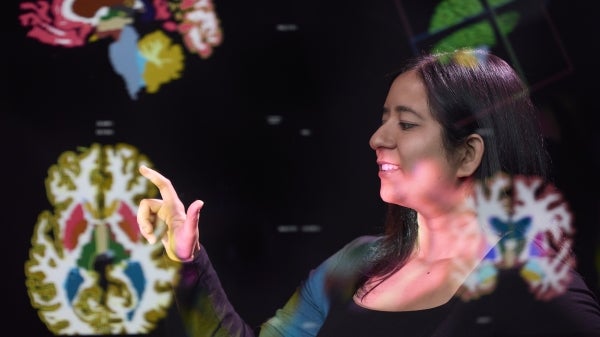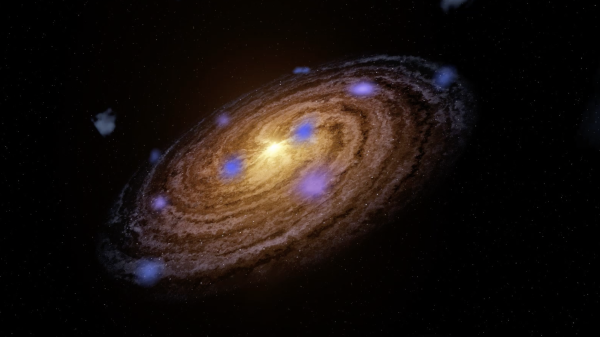ASU researcher honored by White House with Presidential Early Career Award for Scientists and Engineers

Jennifer Barrila receiving the Presidential Early Career Award for Scientists and Engineers at a ceremony on July 25, 2019. Barrila is pictured with Kelvin Droegemeier, director of the White House Office of Science and Technology Policy. Photo by Donica Payne/DOE photographer
Every year, the U.S. government identifies up-and-coming scientists from each state who are deserving of the Presidential Early Career Award for Scientists and Engineers (PECASE). This is the nation’s highest honor bestowed by the U.S. government on outstanding scientists and engineers beginning their independent careers.
This year, Jennifer Barrila, an assistant research professor in Arizona State University's Biodesign Center for Fundamental and Applied Microbiomics, received the PECASE award from the National Aeronautics and Space Administration (NASA) for her research focusing on understanding how infectious disease risks may be altered during spaceflight missions.
“I am extremely honored to have been selected to receive this award, especially among this year’s talented group of scientists,” Barrila said. “It’s been my lifelong dream to contribute new knowledge in support of the human spaceflight program.”
People are living in space for longer periods of time and will continue to do so as humans travel back to the moon and eventually to Mars. Understanding the medical risks associated with these longer-duration stays becomes particularly critical as humans journey farther from the safety and convenience of our planet. This is especially important since studies have shown the immune system is blunted during both short- and long-term spaceflight.
Barrila’s work specifically focuses on how changes in physical forces associated with microgravity, such as exposure to low fluid shear conditions, or the force of fluid that flows across cells, can alter the responses of both human and microbial cells to influence infection.
“It has been a privilege to work with such brilliant and wonderful faculty, postdocs, students and staff at Arizona State University, NASA and our collaborating institutions to better understand infectious disease risks associated with human spaceflight,” Barrila said.
Barrila first joined ASU in 2008 as a postdoctoral researcher, working with Cheryl Nickerson, also a researcher at the Biodesign Institute and a professor at ASU’s School of Life Sciences. Nickerson’s research demonstrated that certain microbes, like Salmonella, can dramatically change their disease-causing characteristics and gene expression in response to spaceflight and spaceflight analogue culture.
Many of those studies were performed when the bacteria were cultured during spaceflight and then brought back to Earth to infect the hosts. However, more information was needed about how the infection would proceed when both the host and pathogen were exposed to microgravity conditions.
Barrila’s first experience in working on a spaceflight experiment was when she helped co-lead a study called STL-IMMUNE, which launched aboard Space Shuttle Discovery in 2010. The research team performed the first in-orbit infection using human cells in order to study the molecular responses to infection when both host and pathogen were exposed to spaceflight.
Since that time, Barrila has been an investigator on four experimental payloads that either have traveled, or will travel, to the International Space Station. She has also co-led the effort of a large multidisciplinary team to apply a multiomics approach to more deeply explore the impact of modeled microgravity on the host-pathogen interaction between Salmonella and the team’s 3D co-culture model of human colon tissue comprised of both epithelial and immune cells, which was also developed using NASA technology.
Her current research advances these studies by incorporating fecal microbiota from astronauts to better understand how changes occurring to the human microbiome may alter susceptibility to infection.
In 2014, Barrila received the Thora W. Halstead Young Investigator’s Award from the American Society for Gravitational and Space Research.
This award is a further testament to the significance of her work as well as the fruitful collaborations ASU has fostered.
Barrila is one of three ASU researchers honored this year. Sefaattin Tongay, an associate professor of materials science and engineering, who was nominated by the National Science Foundation, and Yuji Zhao, an assistant professor of electrical and computer engineering, was nominated by the Department of Defense.
More Science and technology

Podcast explores the future in a rapidly evolving world
What will it mean to be human in the future? Who owns data and who owns us? Can machines think?These are some of the questions…

New NIH-funded program will train ASU students for the future of AI-powered medicine
The medical sector is increasingly exploring the use of artificial intelligence, or AI, to make health care more affordable and…

Cosmic clues: Metal-poor regions unveil potential method for galaxy growth
For decades, astronomers have analyzed data from space and ground telescopes to learn more about galaxies in the universe.…